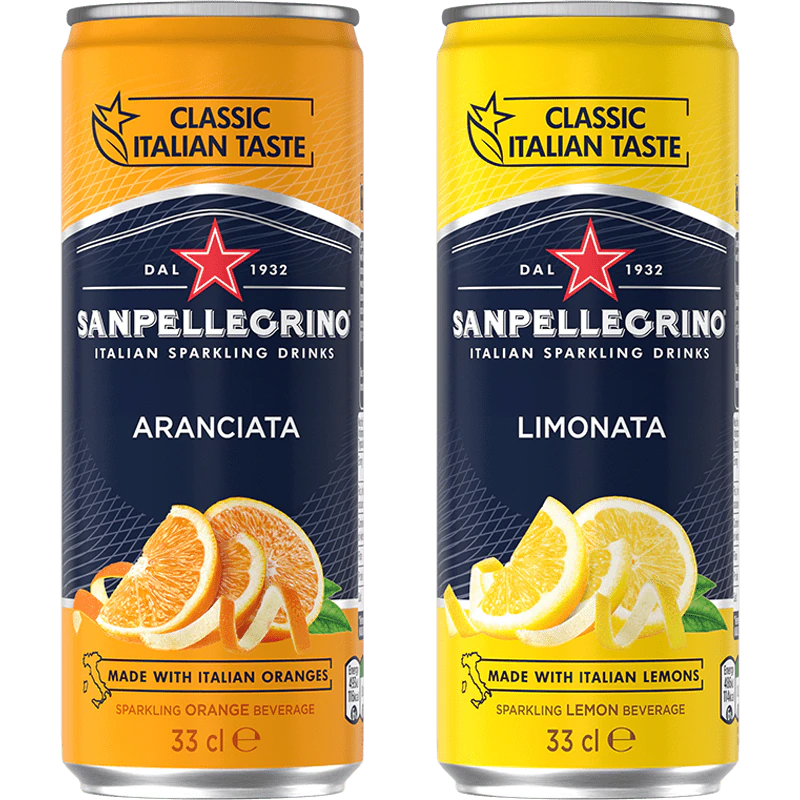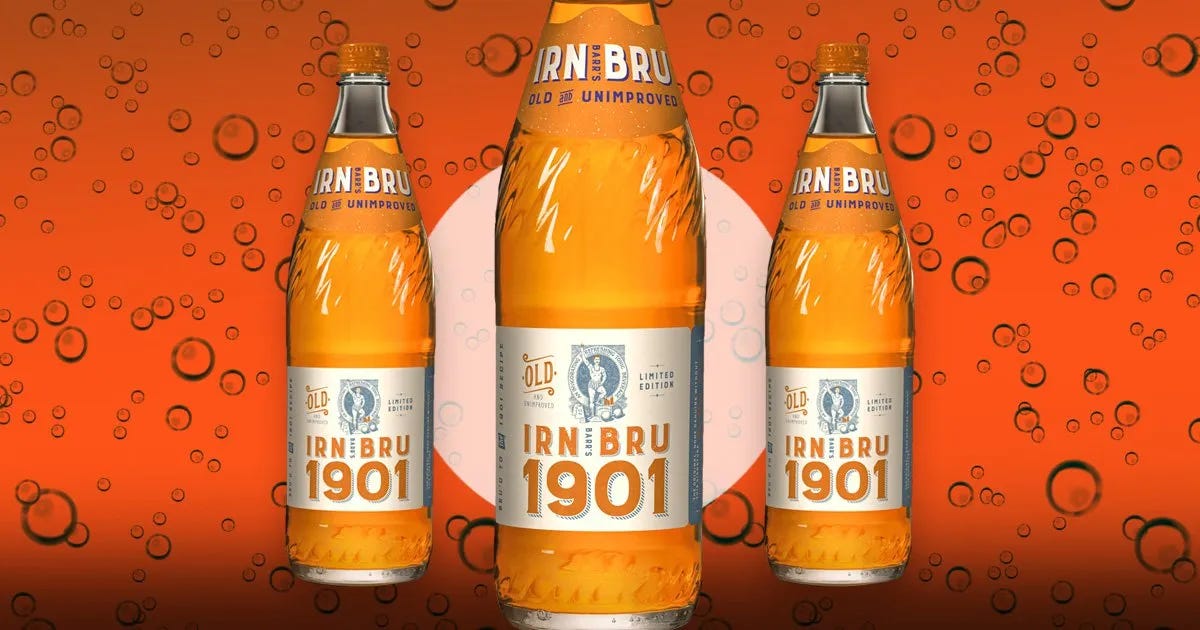How The Sugar Tax Ruined Soft Drinks
Words by Jonathan Nunn, Amelia Horgan, Ophira Gottlieb, Owen Hatherley and Rebecca May Johnson. Illustration by Sinjin Li.
Good morning and welcome to Vittles Season 7: Food and Policy. Each essay in this season investigates how policy intersects with eating, cooking and life. If you wish to receive the Monday newsletter for free weekly, or to also receive Vittles Recipes on Wednesday and Vittles Restaurants on Friday for £5 a month or £45 a year, then please subscribe below.
In yesterday’s piece on the sugar tax The Demon in the Can Professor Karen Throsby argues that the sugar tax is a policy that over-promised the benefits it could deliver, shifting the blame for complex health and social problems onto individual consumers. Today, Jonathan Nunn, Amelia Horgan, Ophira Gottlieb, Owen Hatherley and Rebecca May Johnson look at another aspect of the sugar tax: how the reformulation of their favourite soft drinks to circumvent the tax, and the additions of artificial sweeteners, have made them inaccessible and undrinkable.
Crossing the Rubicon
by Jonathan Nunn
The post-sugar-tax reformulation of fruit soft drinks is a relatively minor legacy of a Conservative government that made it its mission to run the standard of living in this country into the ground, but it’s one worth examining in further detail. Here are the facts: up until 2018 Rubicon Passion Fruit and Blood Orange Sanpellegrino were two of our finest drinks – one the Sauternes of the kebab shop, the ideal accompaniment to takeaway food, and the other a drink capable of making you feel like you were drinking an aperitivo on the Piazza Navona even when you were knocking one back on a Sainsbury’s forecourt.
When I think of Rubicon in particular, I come over with a severe case of binmenism. Do you remember real Rubicon? Remember when your mum would buy you a kebab roll and a cold can of Rubicon as a post-shopping treat? They’ve stolen that from you. Six years on, the impact of the reformulation (in Rubicon’s case, reducing the amount of sugar to 4.5g and replacing the rest with sucralose) has not helped improve health outcomes, or reduced the power of the companies that own Rubicon and Sanpellegrino (AG Barr and Nestlé respectively), but it has reduced the standard of my life and the standard of every life in this country. Both drinks are now imposters, vile simulations of what they used to be. While Coca Cola can create a sugarless replacement that uses its own artificiality as a virtue (Diet Coke), fruit soft drinks have suffered most from the sugar tax, as reducing or removing the sugar fundamentally alters the taste of the fruit, replacing it with an uncanny valley version of itself.
Sanpellegrino knows this, too. In reaction to the sugar tax, it also introduced a ‘Classic Italian Taste’ with more sugar – which, because Sanpellegrino are cowards, is only available through Ocado (and still has 10 % less sugar than the pre sugar-tax version). On the Sanpellegrino website, one FAQ is, ‘Are you introducing the Classic Italian Taste because you have had lots of negative feedback on your new recipe?’ ‘No we are not’, they reply, turning the Sanpellegrino FAQ section into a house of lies. If our food industry is going to be dominated by powerful conglomerates – and it is, unless real policy intervenes – then the least they can do is give us a small moment of pleasure. Until then, you will find me in France – where they tax artificial sweeteners too – stocking up on the taste of my childhood.
End of an Italian Fantasy
by Amelia Horgan
I wasn’t allowed sweets until I was quite old – maybe three or four. This, I imagine, was supposed to instill in me an aspirational abstinence. Naturally, it did not work. Instead, it made me greedy and sneaky, and all my best childhood memories are of getting sugary sweet things and eating them: the two hulls of a Kinder Egg; the Ben’s Cookies shop that opened next to my primary school. I once had a dream where school dinners were replaced with a lurid dessert bar. Instead of plates, there were massive meringues.
Because all of this was secret, it was also shameful. I was worried about my teeth falling out, particularly after seeing the posters in the dentist’s office proclaiming how many grams of sugar there were in my favourite drinks and snacks. This is to say that sugar has been, for me, the source and site of embarrassing fantasy for a long time. Because I was terrified that sugar would one day instantaneously dissolve my teeth, I limited soft drinks to the gloopy, gooey, metallic flavour of artificial sweeteners, with two exceptions: Sanpellegrino’s Limonade and Limone e Menta.
Because these drinks were ostensibly Italian (in fact, Sanpellegrino has been owned by Nestlé since 1997), I managed to convince myself, against all anxiety, that they must be near enough healthy. They started as a rare treat, cutting through the grease of takeaway pizza. But things snowballed, and I found myself ordering boxes and boxes.
On European holidays, because you can’t get Diet Coke, normally I’ll have a Coke Zero. But Sanpellegrino’s two lemonade variations (the sugary kind) figured as a holiday special, too – I’m in Italy! It wasn’t long, though, before greedy sips of delicious lemon, sometimes cut with semi-sophisticated mint, brought back my paranoia about having a sugar film on the teeth – and the feeling I’d been hoodwinked by a fantasy version of Italy. However, the drinks were simply too tasty to stop.
In 2018, Nestlé changed the recipe for their Sanpellegrino line. They replaced 40% of the sugar with stevia to get around the sugar tax – reducing the sugar content to less than 5g per 100ml. I tried one lousy post-tax can: I was no longer in Italy. The hybrid sweetness recipe – apparently the product of years of research and development – was somehow, for me, both too sweet and not sweet enough. And all the talk of excess (even if now-reduced) sugar took me fearfully back to the dentist’s office; it was over.
Punished by Mitsuya Cider
by Owen Hatherley
Crohn’s disease is capricious and unpredictable, but for me there is one absolutely fail-safe trigger for a flare-up: sweeteners. The Crohn’s or colitis sufferer might notice it for the first time, as I did, upon eating a box of Tic-Tacs. Not long after enjoying these cleanly sugar-free delights, there were painful cramps, followed by a night copiously expelling anything that might ever have been in my digestive system. This experience was repeated for me on many occasions upon the passing of the Sugar Tax – oh, a harmless can of Sprite! A can of Ginger Beer! Irn-Bru has never done me any harm! Only after a few experiences of losing an entire night to diarrhoea and cramps did I realise the pattern.
Personally, I would choose the slower damage caused by the gradual rotting away of my teeth than the guaranteed, if temporary, liquidation of my internal organs. And yet somehow, this apparently very common reaction was never factored into the equation when the sugar tax was proposed – anything related to toilets or bowel disorders or the like being regarded here as a bit of a joke – it might give you the trots eh, giggle giggle etc. And so, if I go to the average fast food emporium near where I live in south-east London and decide I might like to include a drink in my Meal Deal, I have the choice between Classic Coke, and water.
In a café, you generally have to rely on guesswork – tea, no matter how sugary, will be Aspartame- and ‘Ace-K-’ free unless you request otherwise; but bottled and canned iced tea, outside of Chinese and Japanese cafes, absolutely will not. In a corner shop, you can at least read the backs of the cans. Abroad, you generally are less likely to be confronted with the problem unless the drink in question is explicitly described as, say, Bez Cukru (‘without sugar’ – one of the first Polish phrases I learned). On a recent trip to Japan, as a long-time non-smartphone user, I would ask my partner to train Google Translate’s picture app on cans of delicious things – to my great delight, Suntory Highballs, Calpis and Pocari Sweat were all drinkable. This led to an overconfidence that was punished by ‘Mitsuya Cider’ (not cider, but a lemonade brand created in misinformed Anglophilia a century ago); mercifully, urban Japan has more public toilets on an average street than Britain has in an average city.
In her crusade against the Nanny State, moronic Greenwich resident Liz Truss had but one good idea – dropping this idiotic policy. Accordingly, I considered for a time reactivating my Twitter account, having formulated in my head my own personal best moralising-trolling take: ‘I don’t know who needs to know this but opposing the policies of Liz Truss is in fact ableism’ - but then, before I had the chance, she was gone, and the sugar tax was still here.
To a Bru
by Ophira Gottlieb
Growing up in Glasgow, our mums would collect gingies and store them in the kitchen by the bins. Gingies are empty glass bottles that once contained Irn-Bru. Back then you could buy a bottle for 70p, bring the gingie to the corner shop, and get yourself a 30p return. That meant you could walk into a shop with an armful of gingies and walk out with a Mars bar, a Brain Licker, and another bottle of Bru. If you tanned the bottle on the spot, you could give it back and get a Freddo.
First they took our glass bottles, and then they took our flavour. The sugar tax hit Scotland like nowhere else in the UK, and not since the discontinuation of the Greggs macaroni pie have the palates of Glasweigans been so offended. The ‘Hands Off Our IRN-BRU’ petition was signed by tens of thousands. Protesters and rioters took to the streets.
And all this for a drink that, famously, has no actual discernible flavour. Throughout the ages, Irn-Bru has invariably marketed itself on the fact that nobody can agree on what it tastes like. A survey found that Scots generally believed the drink to taste of either bubblegum, ginger, or the colour orange – none of which are true – and 56% of Scots agreed with Irn-Bru’s creator A.G. Barr that the drink simply tastes of ‘girders’.
The only thing 100% of Scots can agree on is that Irn-Bru tasted great, and now it tastes less great (the sugar content was halved to 4.7g and the rest replaced with aspartame and acesulfame k). As far as I’m concerned, Irn-Bru tasted of artificial flavouring and sugar, and now it tastes of artificial flavouring and aspartame, tipping the balance from what was once a charming hint of iron girder to an all-out metallic tang. Six years after the introduction of the sugar tax, in response to the widespread outrage that simply never ceased, Irn-Bru brought back the original recipe from 1901, which had even more sugar (11g) than the pre-tax Bru. They even brought it back in the original glass bottle. The only thing we still need back is our gingies.
Energy Crash
by Rebecca May Johnson
Regular small meals and snacks are what people are advised to eat when pregnant – to manage nausea and the fact that you can’t eat a huge amount at once as things become crowded around your digestive system. I’ve become intensely aware of when my blood sugar is crashing and that when I need energy, I need it like, right now. This was the situation, recently, when I was out walking in the Essex town where I live. I had taken a stroll round the seafront, looked in at my favourite charity shop, bought the newspaper and suddenly felt oh my god I need some sugar.
Weak and a little nauseous, I looked to the refrigerator cabinet of the newsagent and picked up a can of Old Jamaica Ginger Beer. I opened it, drank, and then after a moment felt the dreaded mouthfeel and aftertaste of artificial sweeteners. I panicked at not being able to get what I needed – sugar – and was pissed off by the waste. I threw the ginger beer away, undrunk, then went home fast as I could manage and made some toast. I’m not sure why I had faith that it would be OK. Perhaps on a previous occasion I’d found a rare example of Old Jamaica’s ‘original recipe’ cans, which contain pre-tax quantities of sugar – 15g – as opposed to the 4.9g per 100ml of the reformulated drink.
I have always been hyper-attuned to the presence of artificial sweeteners in soft drinks and am a long-time hater of Diet Coke (which – another pregnancy discovery – contains twice as much caffeine as regular coke). I was gutted when a visit to a treasured Italian sandwich bar in London was tainted by the instant ick of post-sugar-tax orange Sanpellegrino. While pregnant, soft drinks have had a heightened importance, too, because alcohol is off the menu in pubs. During a previous pregnancy in 2022, I noticed that Fentimans had held out against the tax – I told people, ‘Fentimans is still safe’. Then, just before Christmas 2023, we went to the pub, and I confidently ordered one of their ginger beers, hoping for a corrective to my Old Jamaica experience. I tasted it, and my heart sank. It was adulterated with artificial sweetener, and I abandoned the glass after one sip and got some tap water.
How has the sugar tax affected you?
Credits
Sinjin Li is the moniker of Sing Yun Lee, an illustrator and graphic designer based in Essex. Sing uses the character of Sinjin Li to explore ideas found in science fiction, fantasy and folklore. They like to incorporate elements of this thinking in their commissioned work, creating illustrations and designs for subject matter including cultural heritage and belief, food and poetry among many other themes. They can be found at www.sinjinli.com and on Instagram at @sinjin_li
Jonathan Nunn is a writer and founding editor of Vittles. He is editor of London Feeds Itself.
Amelia Horgan is a writer and editor from London. She is the author of Lost in Work.
Ophira Gottlieb is a writer and bookseller from Glasgow, currently living in West Yorkshire. She has published poetry, short fiction, and creative non-fiction, and is currently working towards her first collection of short stories.
Owen Hatherley is a writer. His most recent books are Artificial Islands , which won ‘best book’ and ‘best monograph’ at the 2023 Architectural Book Awards, and Transitional Objects.
Rebecca May Johnson is a writer and co-editor of Vittles. Her first book is Small Fires, An Epic in the Kitchen.
Vittles is edited by Sharanya Deepak, Rebecca May Johnson and Jonathan Nunn, and proofed and subedited by Sophie Whitehead.









I've completely given up on soft drinks. Every sweetener I've tried has a noticeable and unpleasant taste and aftertaste. I basically just drink water now. The loss of San Pellegrino is particularly sad - it used to be my go-to soft drink on a hot day.
There are still a few great sweetener-free cordials available. Shout out to Belvoir!
How my habits have changed in order to avoid artificial sweeteners:
- I chose Waitrose over M&S and other nearby supermarkets because they actually stock soft drinks without artificial sweeteners;
- Changed from Ribena to the next best blackcurrant cordial without artificial sweeteners (Belvoir Farm Blueberry and Blackcurrant);
- I look forward to trips overseas where I can pick up a bottle of unadulterated Sprite;
- Most interestingly: I stopped going to major fast food chains because of their lack of variety in non-artificial-sweetener drink options, replacing them with bubble tea.